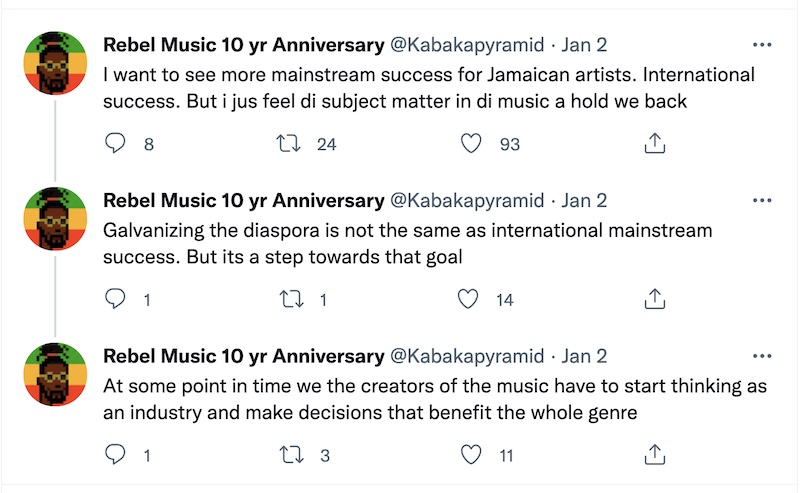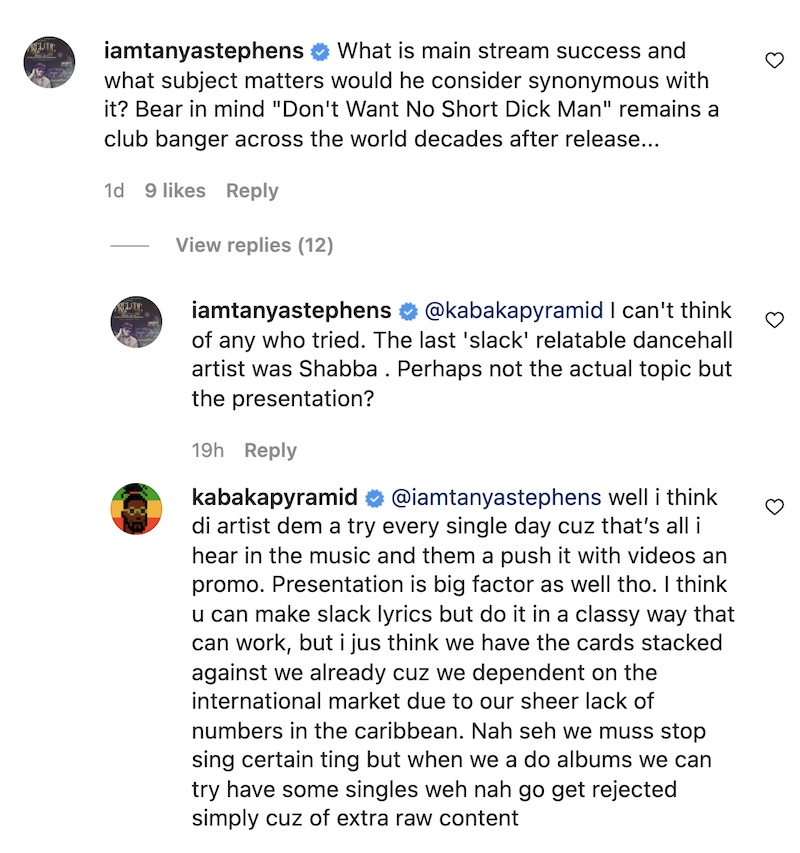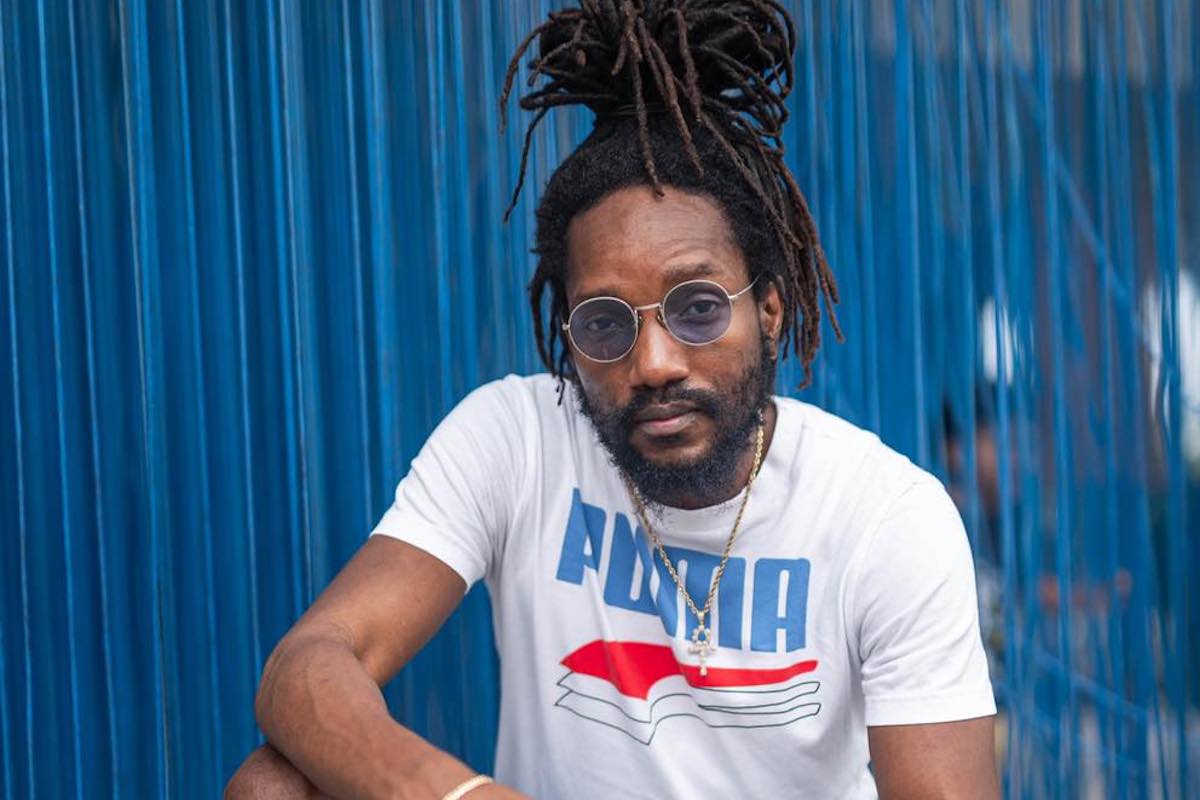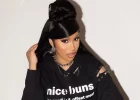Kabaka Pyramid calls for more mainstream success among local artistes, but outlines what he think is preventing that.
It is a new year, yet it seems the same old issues keep resurfacing in dancehall circle. This time it surrounds musicians, artistes, and industry movers and shakers lamenting about the state of dancehall music, its relevance, and how it is packaged for the international market. On Monday, reggae artiste Kabaka Pyramid said on Twitter that while there has been some mainstream success had by several notable Jamaican artistes, the genre itself is nearly stagnant. Why? The reggae lyricist concluded that most of what is being produced is not palatable for the wider international market.
For years, if not decades, this has been an ongoing debate among record producers and artistes, both local and abroad. Prominent members of the musical fraternity have shared the general sentiment that tracks glorifying killing, scamming, and other taboo topics are not being picked up internationally except in small pockets that are not financially sustainable. As such, some dancehall artistes end up pigeon-holing themselves into a box while getting likes and praise from local fans and listeners who are not purchasers of music. Some critics have highlighted these reasons behind the lack of crossover success being achieved. The lack thereof has resulted in missed opportunities to headline or perform at major international concerts such as the Rotterdam concert, the Canadian Reggae Music and Food Festival, or the Ottawa International Reggae Festival.
In a series of tweets, Kabaka stated that, in his opinion, the negative subject matter in most of the music is holding back a lot of artistes.
“I want to see more mainstream success for Jamaican artists. International success. But i jus feel di subject matter in di music a hold we back,” he tweeted.
“Galvanizing the diaspora is not the same as international mainstream success. But its a step towards that goal. At some point in time we the creators of the music have to start thinking as an industry and make decisions that benefit the whole genre,” he continued.
“Check the difference in content of the highest streaming Afrobeats and Reggaeton artistes and you will see.” The ever-controversial Tanya Stephens then challenged Pyramid to define mainstream success, and subject matters should be considered synonymous with that success.

One challenger to Kabaka’s claims shared that Skillibeng’s 2020 hit single “Crocodile Teeth” was able to grace the Billboard charts. To that, Kabaka shot back, “Would u like me to list all the non-violent songs that hit billboard so we can compare? And that’s a remix with Nicki, not the best example. And it’s not only about singles, how are the albums doing?”
For some, there is merit in Pyramid’s analysis. Sean Paul, one of dancehall’s most successful entertainers, previously noted that fans not only gravitate towards his feel-good music that they can dance while listenting. In a 2019 interview, he stated that people could understand what he is saying, while for some more hardcore artistes, people do not understand the heavy patois, so they do not get the message being conveyed. “It’s the language. I can speak in a little tongue that is easier to understand.”
Music producer Skatta Burrell emphasized that players in the industry who know better should do better while highlighting that entertainers should be allowed to make their music and let the chips fall where they may.

“The level of success will speak volume and the domino effect will follow,” he said. “Same way in early 2000 we follow Kartel and NotNice down the dancehall trap path and trap weself while they both continued to make huge dancehall hits that garnered huge success.”
He then cited as an example Kartel’s “Fever,” which was certified gold by the RIA and peaked at No. 2 on the Billboard reggae charts, generating over 100 million views on YouTube. NotNice also produced Spice’s “Suh Me Like It,” which got over 102 million YouTube views.
Dancehall commentators Twins of Twins have been harsh critics of some of their fellow coworkers. The comedic duo previously hinted that the music being produced is watered down while adding that what artists are doing on stage sometimes has nothing to do with music. In August 2019, Patrick’ Curly Lox’ Gaynor expressed that dancehall artistes have taken to gimmicks or raunchiness to try and sell their music but that real music fans are not easily fooled.
“One time people were raunchy and that was it, nowadays the limit and boundaries just keep moving and my problem is not with these limits being tested, it’s that nobody is owning it.”
Curly Lox further blasted the ever-present excuse of entertainers being expressive through their alter-egos.
“Dem a try explain it away by saying it’s their alter ego and people supposed to understand that it is entertainment, but people are defined by how they present themselves. You cannot separate yourself from the consequences of your actions by creating an alter ego. “If that was the case, why dem never make Adidja Palmer stay home wid him kids and lock up Vybz Kartel? Or why Mark Myrie never stay a Jamaica and Buju do 10 years a prison?” He questioned.
In addition to the genre being seen as watered down in the opinion of some, it has also been censored in recent years through tighter restrictions from the Broadcasting Commission. This Curly Lox also said limits the artiste’s ability to communicate what needs to be said effectively and minimizes the message the song is supposed to send.
“Dancehall was the voice of the downtrodden youth and it was communicated in their language. Bounty Killer’s “Anytime” was one of those songs that made people understand the psyche of a ghetto youth, and he was able to reach important ears because of the manner in which the story was told. But if “Anytime.” were to be produced now, it would have no impact, because he could not say ‘Anytime mi hungry again yu a guh see mi nine.'”
The argument about whether dancehall is stalled, dying, or diluted will continue to be an ongoing one both for industry stakeholders, fans of the music, and even members of academia. Senior Studies Lecturer at the University of the West Indies Dr. Sonjah Stanley-Niaah shared her thought a few years ago on the state of Jamaican music after penning her book ‘Dancehall: From Slave Ship To Ghetto.’ In her publication, she expressed that while she agrees that some things have changed and not for the better, there was no real need to be overly anxious.
“The same themes still exist such as the pre-eminence of a creator, male sexual prowess, the power of women, and so on. The music is still youth-driven; it is how they are able to express themselves,” she said.
Among the challenges as she sees it is that young fans are not buying music anymore.
“Streaming has become the new norm with services like Spotify, Pandora etc. The business of making music is also significantly different as is the business of selling music and the business of publicizing music. The EP (Extended Playlist) has become a means that has replaced the album to promote an artiste. Another thing I’ve seen that is a drawback is not a lot of Jamaican artistes are touring in the way that Bob Marley did.”






